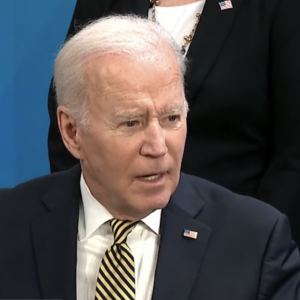KRUCKENBERG: Student Debt Cancellation Plan Is Flatly Unconstitutional

When President Biden was asked at a 2021 town hall event about canceling student debt, he doubted it could be done without working through Congress: “I don’t think I have the authority to do it by signing with a pen,” the president said.
But in August, Biden unveiled his plan to grant up to $20,000 in loan forgiveness to 40 million student debtors. He didn’t bother “signing it with a pen,” announcing the program to grant more than $400 billion by press release — forgoing even the notice-and-comment procedures ordinarily required by law.
Biden should have stuck with his first instinct, which was correct: the president does not have the authority to launch a massive debt-cancellation initiative unilaterally without congressional authorization. That’s why the Pacific Legal Foundation, the public interest law firm where I work, has filed a federal lawsuit to halt the unconstitutional scheme.
Canceling student debt was a central plank of Biden’s platform in his 2020 presidential campaign. But since many members of Congress of both parties were uneasy about shifting to taxpayers the cost of hundreds of billions of dollars in loans, the administration hatched a plan to go around the legislative branch.
Biden’s team points to a 2003 law, the HEROES Act, that allowed the government to modify loans to assist military personnel and their families during war or national emergencies. They argue that the law empowers the president to cancel student debt due to the COVID-19 emergency. The text of the law defies that claim, and the “emergency” claim is even shakier, given that Biden himself declared just a few weeks ago in a “60 Minutes” interview that the pandemic emergency is over.
Biden’s plan has several problems, from its jaw-dropping price tag to the fact that it does nothing to address the root causes of how student debt became such a problem in the first place. Moreover, the hasty and haphazard unveiling of the plan just weeks before hotly contested midterm elections suggests the proposal is driven more by political calculation than sound policy. That is perhaps why the administration did not consider that for many borrowers, including the lead plaintiff in our lawsuit, the cancellation program, which was promised to “automatically” apply to millions of people, would result in a new tax bill that exceeds any benefit they will receive from the loan forgiveness.
Less than 48 hours after we filed our lawsuit, the Department of Education changed course to say it would not “automatically” cancel loans for borrowers already in their system, allowing some to opt-out, and excluded more than 700,000 borrowers from cancellation. These two staggeringly large changes to the program came via silent revisions to a Department of Education website. Although the White House began its “rollout” program last week, there is still no binding documentation for how this half-a-trillion-dollar program will work.
Moreover, both changes were designed to frustrate legal challenges and avoid the likelihood that a court would find the plan illegal. Nowhere in its recent backtracking has the administration contested its unconstitutionality.
Under our constitutional system of government, Congress makes the law and sets spending priorities through the budgeting and appropriations processes. The president executes that law. This arrangement is part of the separation of powers that ensures transparency and accountability to the public. Biden’s unilateral decision to sidestep Congress and add hundreds of billions of dollars to the already crushing national debt, without public comment or legislative consideration, is a serious abuse of executive power.
To be sure, Biden didn’t invent the abuse of emergency powers and executive orders — every recent Republican or Democratic president has done it. Just two years ago, President Trump imposed a nationwide eviction moratorium during the 2020 COVID-19 pandemic emergency that was one of the most blatant abuses of executive power in recent memory — which Pacific Legal Foundation also challenged in court.
If canceling student loan debt is a good idea, the president should present his proposal to Congress, have it handled through the legislative process, sign it into law, and then implement it through executive branch agencies. That’s how it is supposed to work — and our lawsuit is aimed at enforcing the Constitution’s separation of powers.
Please follow DVJournal on social media: Twitter@DVJournal or Facebook.com/DelawareValleyJournal


